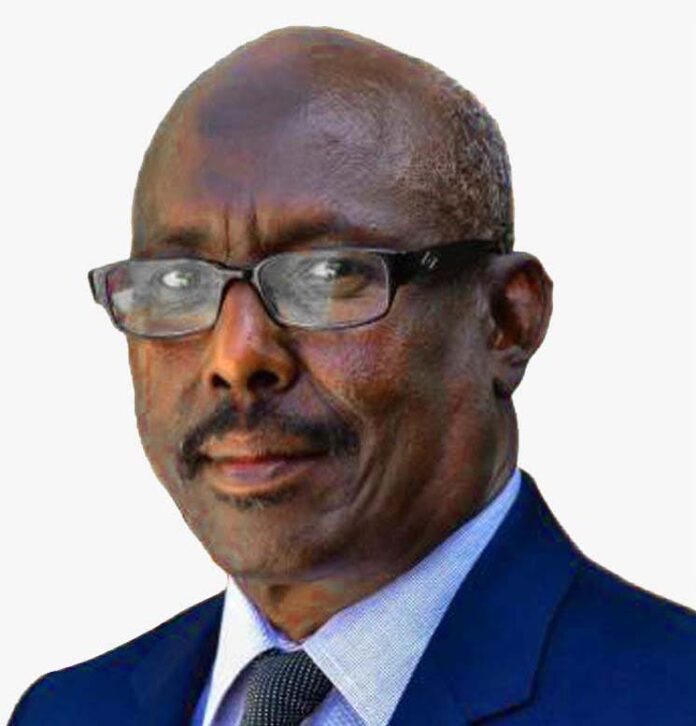Somalia’s post-civil war leaders entrusted with the awesome responsibility of rebuilding the Somali state that completely vanished in 1991 are yet to make headway in the establishment of the foundations for new democratic state which delivers the state functions through an efficient and effective public administration. The state building concretizes with public institutions capable of performing their assigned responsibilities with efficiency, competence, transparency, and accountability exclusively for public interest.
For the last 13 years, Somalia ranked one of the top three fragile and corrupt countries in the world. As of today, Somalia’s state is “House of Cards,” which exists as a scheme for power capture for private interests. The small progress made since 2007 is due to external assistance and private efforts.
Despite 17 years of international support, it’s projected that Somalia needs at least 5 more years of international partnership (code for international care) before it can gain “sovereign capabilities” for taking over its security responsibility and ability to mobilize sufficient revenues for covering its basic needs. The debt relief and the lifting of arms embargo were carrots for encouraging Somalia to stand on its feet.
Somalia’s post-civil war leaders at federal and state levels bear the major blame for the never-ending disorder and state fragility. They are accused of lacking patriotic vision, competence, and integrity required to steer a troubled nation on the path to sovereign state. The cultural affinity among Somalis as one nation has been shattered by the negative experiences of 21-years of military dictatorship, of the armed rebellion movements, and of the civil war and of the corrupt behavior of all post-civil-war governments. Somalia creeps into gloomy outlook because of mass migration, wars, natural disasters, and famine.
To embellish their disappointing leadership, the post-civil war leaders continue to claim falsely that the first president of the Republic of Somalia, Aden Abdulle Osman, best known Aden Adde, who earned for his exceptional stewardship the honor of being called the “father of the Somali Nation” as their role model. But they are no president Aden. Shamefully, they never attempted to learn from President Aden’s exceptional leadership qualities.
Mohamed Isse Trunji and Abdi Ismail Samatar published three books documenting well the biography and history of the successful life and leadership of President Adan as prominent leader of the Somali movement for independence, as the speaker of the first Legislative Assembly in the Italian Trusteeship Somali Territory in 1957, and later as the first president of the independent Republic of Somalia, today’s Federal Republic of Somalia, composed of the union of two territories formerly under the Italian trusteeship territory (South Somalia) and British colony (North Somalia) on July 1, 1960. Mohamed Isse Trunji’s books are “Somalia: The Untold History 1941-1969 (2015)” and “President Aden Abdulla – His Life and Legacy (2023).” Abdi Ismail Samatar’s book is “African’s First Democrats -Somalia’s Aden A. Osman and Abdirizak H. Hussen (2016).”
President Adan (May Allah grant him Jannatul Firdowsa) led the post-colonial Somali state for seven-years from July 1, 1960 to June 26, 1967. In those seven years, serious existential crisis that endangered the national unity and security happened but were quickly, properly, and wisely addressed with the guidance of president Aden Abdulle who doggedly spearheaded the consolidation of the Somali democratic state, where defense and protection of national sovereignty, unity, territorial integrity, justice, individual freedom and liberty, and good governance were top priorities. The transition to self-governing Somali state was remarkable.
The president’s roles, responsibilities, and powers in the 1960 constitution were almost similar to those in the 2012 provisional constitution. President Aden not only adhered faithfully to the letter and spirit of the 1960 constitution, but also followed the best practices in good governance to strengthen public trust in government. According to both constitutions, the president, as head of the state, symbol of national unity, and guardian and promoter of the constitution is expected to act as not member of political party, group or faction. President Aden knew well his responsibilities of oversight and checks and balances.
As extensively explained in the abovementioned books, President Aden kept diary in which he recorded his daily activities like meetings, briefings, conferences, telephone calls, and personal reflections. He fulfilled his duties with unshakable virtues of honesty, wisdom, prudence, fortitude, temperance, forbearance, justice, and excellent judgement. He never preoccupied for how to stay in power or be reelected at the end of his term. He wrote in his diary, “Only Those who are not afraid of losing power can gain firmness of purpose.”
Unfailingly, President Aden respected the separation of power and responsibilities among the three branches of the government, at the same time he was neither ceremonial nor usurper president.
In his book, Mohamed I. Trunji noted the following on President Aden’s Leadership: “As Head of the State, he crystallized the power of the presidency as part of the government’s three branches, able to exercise authority, when necessary, but also able to accept the balance of power inherent in the parliamentary system.” He made his best efforts to ensure the national unity and the adherence of the government activities to the rule of law. Free and fair political competition and elections were his main concern.
After his presidential election, he requested the inclusion of opposition politicians who did not vote for him in the new cabinet. He was tenacious advocate and defender of the role of the political opposition. He loathed corruption, abuse of power, favoritism, nepotism, misuse of public property for private interests, election fraud, and violation of individual freedom and liberty.
He valued to appoint and promote competent, honest, hardworking individuals for government positions from Prime Minister to Janitor. He was troubled, offended by the corrupt behavior of the members of the parliament who were bargaining their votes for bribery or government positions rather than for the pursue of public interest. I had the opportunity of knowing President Aden’s private secretary, Mohamed Waberi Ali (May Allah grant him Jannatul Firdowsa), true public servant who reflected President Aden’s values of patriotism, forbearance, competence, and integrity.
President Aden worked round-the-clock at Villa Somalia, keeping his eyes and ears on the performance of all state institutions as well as on public complaints. He pushed for control of government budget and borrowing, and travel abroad to minimize budget deficit and achieve independence from foreign aid. In his diary, on the fiscal budget, he wrote, “the level of foreign contribution needed to cover the national budget deficit, without taking into account the economic development, is really high, and to tell the truth, we should take the blame. It is inconsistent with the self-respect, and dignity of independent people to rely any longer than is necessary on the generosity of foreigners for covering ordinary budget deficit and for providing fund for development projects.” He considered the dissolution of the parliament after the members of parliament increased their monthly salary from SoSh 1,000 to SoSh. 2,000 at a time Somalia was facing humanitarian disaster.
President Aden was active identifier of the problems threatening the nation and promoter of real solutions. For example, he wrote in his diary, “I have to talk seriously to Prime Minister Abdirashid Ali Sharmarke over the mistrust between the Somalis, particularly Darod and Hawiye clan families, which continues to gain ground like climbing a devilish shrub. …We have to take action and study in depth how to uproot the dangerous leech.”
Despite he grew up in extreme poverty, he had never shown inclination for extravagance, desire for self-enrichment for himself, members of his family, and friends. He denied his family any preferential treatment like access to positions and use of public assets. He was never accused or rumored of impropriety of any kind in his whole political life.
He rejected financial support from his friends for buying votes to gain power or remain in power. He never asked personal loyalty from anyone nor was loyal to his supporters for unfair reasons. He was rare crusader for building harmonious, peaceful and prosperous Somali nation. Somalia needs the virtuous Leadership of President Aden to gain sovereign capabilities critical for an independent nation/state.
Dr. Mohamud M Uluso
Mohamuduluso@gmail.com
The views expressed in this article belong to the author and do not necessarily reflect the editorial policy of Horn Broadcasting Network.


